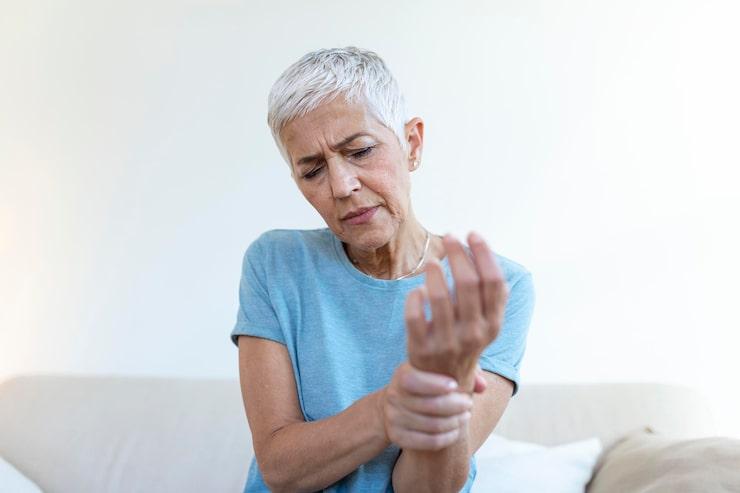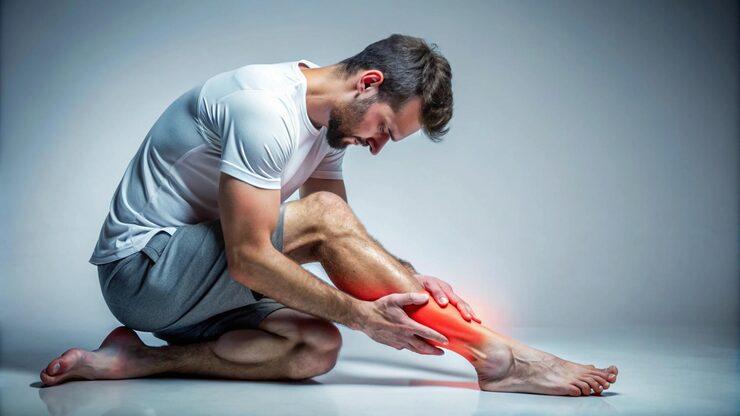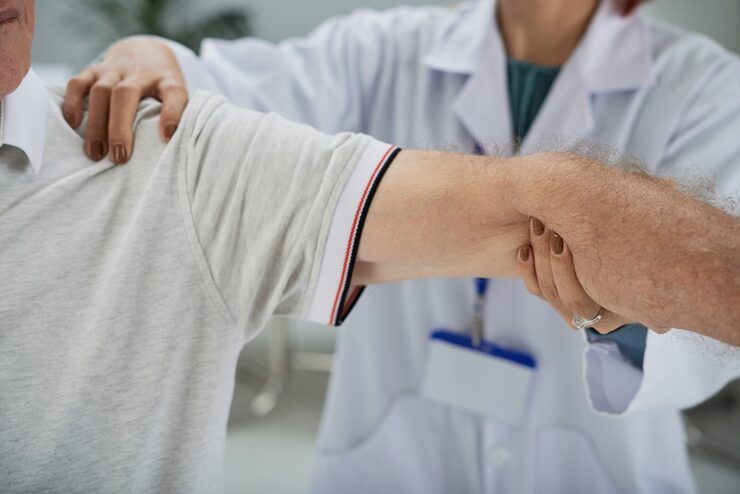
person with weak bones
The bones in our bodies are what keep us standing, moving, and strong. They protect our organs, help our muscles function, and store essential minerals like calcium and phosphorus. But a lot of individuals don't know that their bone health can slowly worsen over time, putting them at risk for fractures, discomfort, and diseases like osteoporosis.
Weak bones often don't show any signs until a catastrophic injury occurs. That's why it's essential to recognize the early signs and seek medical care promptly.
This article talks about the indicators of weak bones, the most prevalent reasons, and the best strategies to strengthen and repair your bones so that they stay healthy for life.
Bones are living tissues that are constantly growing and changing. Resorption is the process by which old bone tissue breaks down, whereas creation is the process by which new bone forms. This process is balanced in young adults, but as we age, bone loss begins to occur faster than bone growth.
When this equilibrium shifts too far toward bone loss, bones become thinner and more fragile, resulting in increased weakness. Osteoporosis is the medical term for very weak bones.

man suffering from pain due to weak bones
Over time, several things can make bones weaker:
People sometimes term bone loss a "silent condition" since it gets worse without any apparent signs until a fracture happens. However, sure subtle warning signs can indicate that something might be amiss.
1. Getting hurt or breaking bones often
If you acquire fractures or hairline cracks from minor falls or even just moving around, it's a sign that something is wrong.
For instance, if you break your wrist from a minor fall or get spine compression fractures, it could mean that your bones are weak.
These "fragility fractures" are one of the first signs of osteoporosis.
2. Height loss
If you lose more than half an inch of height over a few years, it could mean that your spine's bones are weak.
This occurs when the vertebrae have compression fractures, which cause the bones to weaken and deteriorate over time.
You may also notice a bent or hunched back, known as kyphosis.
3. Pain in the back
Minor fractures in the vertebrae can sometimes cause persistent or sudden back discomfort.
You can get these fractures without falling; they might happen just from moving around in your daily life.
If you experience unexplained back discomfort, you should undergo imaging testing to rule out any underlying bone weakness.
4. Weak Grip Strength
Research indicates that grip strength is often associated with overall bone density.
If you find it more challenging to open jars, carry groceries, or lift light weights, it could be an early sign that your bones and muscles are getting weaker.
5. Weak teeth and brittle nails
Your nails and teeth reveal the health of your mineral and calcium levels.
Weak, brittle nails and teeth that are sensitive can sometimes mean that you don't get enough of specific nutrients that can affect your bones.
6. Bad posture and balance
As bone density and muscular strength decline, it may become more challenging to stand up straight or maintain your balance.
Having weak bones and muscles makes you more likely to fall, which can break bones.
7. Osteoporosis runs in the family
If your parents or grandparents had osteoporosis or broken bones often, you are more likely to get it.
Family history is a major predictor of bone strength and should not be overlooked, even if you feel healthy.
If you have any of the symptoms listed above or are in a high-risk group, you should see an orthopedic specialist or endocrinologist right away.
Some standard tests for diagnosis are:

person getting treatment for weak bones
You can help strengthen and support weak bones through medical care, dietary adjustments, and lifestyle modifications.
1. Food A lot of Calcium and Vitamin D
Calcium is what bones are made of, and vitamin D helps your body absorb calcium well.
Foods high in calcium include milk, yogurt, cheese, tofu, almonds, leafy greens, and fortified cereals.
You can obtain vitamin D from sunlight (10 to 15 minutes a day), fatty fish such as salmon or tuna, egg yolks, and milk that has been fortified.
If your doctor advises, those over 50 may need 1,200 mg of calcium and 800 to 1,000 IU of vitamin D daily.
2. Drugs that make bones stronger
If your bone density test indicates that you have osteoporosis, your doctor may prescribe medications such as bisphosphonates (e.g., alendronate or risedronate) to help slow down bone loss.
Hormone replacement treatment (HRT) helps postmenopausal women keep their estrogen levels stable.
Denosumab: An injectable therapy that helps bones grow thicker.
Teriparatide is a synthetic hormone that helps stimulate new bone growth.
After a thorough assessment of your health and condition, these drugs are given to you.
3. Exercises that involve weight and resistance
One of the most natural ways to strengthen bones is through exercise.
Walking, dancing, climbing stairs, and jogging are all weight-bearing exercises that can help grow bone mass.
Resistance training: Using weights, bands, or your own body weight to work up your muscles that support your bones.
Balance exercises: Yoga and tai chi lower the chance of falling and make your posture better.
Five days a week, try to get at least 30 minutes of moderate activity.
4. Changes to your lifestyle to protect your bones
Making small changes to your daily life can have a significant impact on your bone health:
Stop smoking: Smoking makes it harder for your body to absorb calcium.
Limit alcohol: Drinking too much alcohol slows down bone growth and makes falls more likely.
Maintain a healthy weight: Being underweight can lead to less dense bones, while being overweight can put excessive stress on your joints.
To avoid falls, keep floors clear of clutter, wear shoes that support your feet, and put grab bars in the restroom.
5. Checking regularly
You should examine your bone health every so often, especially if you are postmenopausal, have a chronic illness, or are on medication for a long time.
Follow the advice to have DEXA scans every one to two years.
Regular check-ups with your doctor ensure that your treatment is working effectively.
6. Rehabilitation and Physical Therapy
Rehabilitation is essential for people who have already broken bones.
Physical therapists help people move more effectively, maintain their balance, and improve muscle coordination.
Gentle stretching and strengthening activities help people feel better and go back to normal.
Many hospitals offer specialized clinics for bone health or osteoporosis, where teams of doctors, physiotherapists, and dietitians collaborate to help individuals improve their condition.
Even if your bones are strong right now, doing things that are good for your bones now can help you later in life.
1. Is it possible to fix weak bones?
Yes, most of the time. You can slow down or even reverse bone loss by eating a balanced diet, taking the proper medications, and engaging in regular exercise.
2. How often do I need to examine my bone density?
Women over 50 and men over 65 should undergo a DEXA scan every one to two years, or as directed by their doctor.
3. Do you need supplements to keep your bones healthy?
You might need to take supplements if you don't get enough calcium or vitamin D in your diet. Before using any supplement, consult your doctor.
4. Are bones weak in young people?
Yes. At any age, bones can become weak because of a bad diet, not getting enough exercise, smoking, or other medical disorders.
5. Does walking help bones get stronger?
Of course. One of the easiest and best ways to keep your bones strong is to walk.
Even though weak bones may not show evident signs, they can have a significant effect on your health and quality of life. Getting medical care right once you notice indicators like recurrent fractures, back pain, or loss of height can make a significant impact.
You can regain your bone strength, prevent fractures, and lead a whole, healthy life with the correct diagnosis, treatment, and lifestyle adjustments.
Orthopedic doctors and physiotherapists work together at modern hospitals and bone health clinics to make tailored care plans that help you move freely, live confidently, and keep your bones strong for life.
We offer expert care across key specialties, including Medicine, Cardiology, Orthopaedics, ENT, Gynaecology, and more—delivering trusted treatment under one roof.
Prakash Hospital Pvt. Ltd. is a 100 bedded NABH NABL accredited multispecialty hospital along with a center of trauma and orthopedics. We are in the service of society since 2001.
OUR SPECIALITIES
Contact Us
D – 12A, 12B, Sector-33, G. B. Nagar, Noida, Uttar Pradesh 201301
+91-8826000033

© 2026 All rights reserved.
Designed and Developed by Zarle Infotech